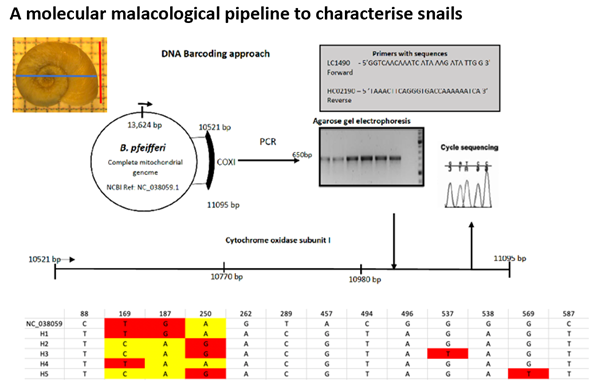
With the launch of the new HUGS website, this creates an opportune online moment to reflect how PhD student-led research has provided a foundation to underpin HUGS' OneHealth approach. This blog features the research activities of Mr Mohammad Al-Harbi who is soon to submit his PhD thesis for examination. Mohammad has conducted seminal molecular malacological research in Malawi where he also assisted the PhD studies of Seke Kayuni who recently secured his PhD from the LSTM before HUGS formally started.
Mohammad writes…
During my PhD, I conducted several malacological surveys in Malawi and Saudi Arabia. In so doing, this helped me better understand how schistosome transmission in Africa and the Middle East can be similar but also significantly different. From my collections of various freshwater snails within each country, I was able to better understand their population genetics, snail-trematode interactions and ecological settings, respectively. Whilst I have maintained a strong focus on Bulinus, the intermediate snail hosts of Schistosoma haemtobium, the blood fluke that causes urogenital schistosomaisis, I have collected other snails that transmit important medical and veterinary parasites.
Today, I have now gained practical experience in several methods of snail research. These range form field collection with mapping techniques, to the application of state-of-the art DNA typing assays. I have really enjoyed analysing my data obtained from DNA sequencing, microsatellite DNA genotyping and PCR-RFLP assays which helped me identify snails and much better infer their phylogenetic relationships. Furthermore, I have used molecular xenomonitoring tools to detect schistosome DNA within various snail species using real-time PCR methods. This is more or less the same DNA assay used in clinical practice to diagnose schistosomiasis in people.
Visting Malawi in 2017, my research took an unexpected turn upon the discovery of Biomphalaria in Lake Malawi. In 2019, I published a report “Biomphalaria pfeifferi Snails and Intestinal Schistosomiasis, Lake Malawi, Africa, 2017–2018” in the USA-CDC journal Emerging and Infectious Diseases. This was the first report of Biomphalaria pfeifferi within Lake Malawi which overturned the existing appraisal that transmission of intestinal schistosomaisis could not take place. Indeed, an outbreak of intestinal schistosomiasis was later confirmed by Seke Kayuni alongside his detailed studies of male genital schistosomaisis which I have co-published with him in several.
From sampling schistosomes obtained from children, I successfully extracted DNA from individual parasite eggs that were subjected to detailed genotyping with cox1, ribosomal ITS & 18S markers, respectively. This led to a first appreciation that hybrid-schistosomes were present in Malawi, noting combinations of S. haematobium-mattheei and S. haematobium-bovis. Continuing with my snail studies I have also uncovered much greater species diversity within Bulinus that was previously unknown. As a consequence, this has opened up new transmission pathways for these S. haematobium-hybrids which HUGS is now set to explore using my precisely drawn my snail distribution maps.
My PhD research in the UK, Malawi and Saudi Arabia has really helped me understand the importance of academic collaboration, scientific networking and targeted application of DNA-assays. I am now much more confident to develop my career in research and control activities against neglected tropical diseases and am especially grateful to my UK supervisors Prof Russell Stothard and Dr James LaCourse who have helped my throughout my PhD journey.
Mohammad H. Alhabri
e-mail: mohammad.alharbi@lstmed.ac.uk